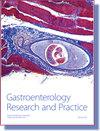Evaluation of Antireflux Mucosectomy for Severe Gastroesophageal Reflux Disease: Medium-Term Results of a Pilot Study
IF 2
4区 医学
Q3 GASTROENTEROLOGY & HEPATOLOGY
引用次数: 0
Abstract
Background Antireflux mucosectomy, a new endoscopic treatment for gastroesophageal reflux disease, consists of endoscopic mucosal resection at the esophagogastric junction. This study aim was to evaluate the medium-term efficacy of the antireflux mucosectomy technique for patients with severe gastroesophageal reflux disease symptoms (proton pump inhibitor treatment-dependent or proton pump inhibitor treatment-resistant gastroesophageal reflux disease). Methods Between January 2017 and June 2018, 13 patients with severe gastroesophageal reflux disease without hiatal hernia, with positive pH reflux, were included in this monocentric prospective pilot study. The primary outcome was clinical success, defined by improvement evaluated by the Gastroesophageal Reflux Disease Health Related Quality of Life Questionnaire at 24 months. Secondary outcomes were technical success, decreased use of proton pump inhibitors, patient satisfaction, and adverse events. Results Thirteen patients [females = 8 (62%)], mean age 59 (range, 54-68), were included. The antireflux mucosectomy procedure had technical success in all patients. At 24 months, for 11 patients, gastroesophageal reflux disease symptoms were significantly improved, and mean gastroesophageal reflux disease score decreased from 33 (range, 26-42) to 3 (range, 0-7) (p = 0.001). Ninety-one percent (n = 10) of patients had a lower proton pump inhibitor intake at 24 months. One patient had 3 endoscopic balloon dilatations for EGJ stenosis, two patients had melena ten days after procedure, and seven patients had thoracic or abdominal pain. Patient's satisfaction at 24 months was 81%. Conclusions In patients with severe gastroesophageal reflux disease, despite occurrence of several short-term adverse events, antireflux mucosectomy seemed effective in improving gastroesophageal reflux disease symptoms at 24 months. This trial is registered with ClinicalTrials: NCT03357809.抗反流粘膜切除术治疗严重胃食管反流病的疗效评价:一项初步研究的中期结果
背景抗反流粘膜切除术是一种新的内镜治疗胃食管反流疾病的方法,包括食管胃交界处的内镜粘膜切除术。本研究的目的是评估抗反流粘膜切除术对有严重胃食管反流疾病症状(质子泵抑制剂治疗依赖性或质子泵抑制剂耐药性胃食管反流病)患者的中期疗效。方法在2017年1月至2018年6月期间,13名无裂孔疝、pH值反流阳性的严重胃食管反流病患者被纳入这项单中心前瞻性试点研究。主要结果是临床成功,定义为24个月时通过胃食管反流病健康相关生活质量问卷评估的改善。次要结果是技术成功、质子泵抑制剂使用减少、患者满意度和不良事件。结果13例患者[女性=8例(62%)],平均年龄59岁(范围54-68岁)。抗反流粘膜切除术在所有患者中都取得了技术上的成功。24个月时,11名患者的胃食管反流疾病症状显著改善,平均胃食管反流病评分从33分(26-42分)降至3分(0-7分)(p=0.001)。91%(n=10)的患者在24个月内质子泵抑制剂摄入量较低。1名患者因EGJ狭窄进行了3次内镜球囊扩张,2名患者在手术后10天出现黑便,7名患者出现胸痛或腹痛。患者在24个月时的满意度为81%。结论在严重胃食管反流病患者中,尽管发生了一些短期不良事件,但抗反流粘膜切除术在24个月时似乎能有效改善胃食管反流病症状。该试验已在临床试验注册:NCT03357809。
本文章由计算机程序翻译,如有差异,请以英文原文为准。
求助全文
约1分钟内获得全文
求助全文
来源期刊

Gastroenterology Research and Practice
GASTROENTEROLOGY & HEPATOLOGY-
CiteScore
4.40
自引率
0.00%
发文量
91
审稿时长
1 months
期刊介绍:
Gastroenterology Research and Practice is a peer-reviewed, Open Access journal which publishes original research articles, review articles and clinical studies based on all areas of gastroenterology, hepatology, pancreas and biliary, and related cancers. The journal welcomes submissions on the physiology, pathophysiology, etiology, diagnosis and therapy of gastrointestinal diseases. The aim of the journal is to provide cutting edge research related to the field of gastroenterology, as well as digestive diseases and disorders.
Topics of interest include:
Management of pancreatic diseases
Third space endoscopy
Endoscopic resection
Therapeutic endoscopy
Therapeutic endosonography.
 求助内容:
求助内容: 应助结果提醒方式:
应助结果提醒方式:


